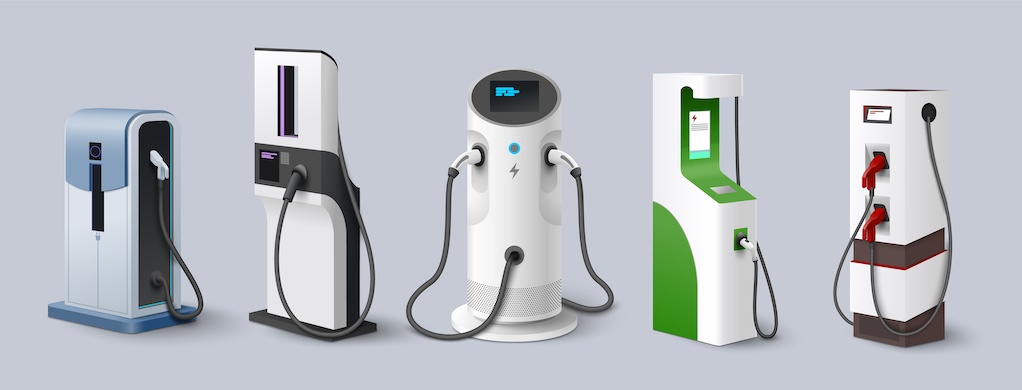If you’re thinking about including EV chargers in your parking, you’re on the right path.
Having workplace charging stations available can be a key factor in attracting and retaining employees, as it shows that the company is committed to supporting sustainable transportation options. In addition, workplace charging can help businesses meet their environmental goals, as EVs have lower emissions than traditional gasoline-powered vehicles.
This is also a better time than ever to consider equipping your parking facilities with low-emission accessibility. The push for carbon neutrality in office buildings is more pressing than ever with multiple laws on the horizon pushing businesses to improve their sustainability.
Offering environmentally conscious alternatives can go a long way to earning a LEED certification, which also has other positive implications. To learn more on that, check out How Green and LEED Standards Benefit Your CRE.
But with so many different types of chargers on the market, how do you know which one is right for you? In this blog post, we will discuss the three main types of EV chargers and help you decide which one is best for your business.
Level 1 Chargers
Level 1 chargers are the slowest option. Even though they're the cheapest charger, they are simply not fast enough for a work place. They use a standard 120-volt outlet and can only provide 3-5 miles of range for every hour they are connected to an EV or plug-in hybrid electric vehicle (PHEV). This is known as trickle charging because it typically takes 30 hours to replenish 150 miles of range at Level 1's fastest. The amount of time it takes to charge an EV depends mostly on the vehicle's efficiency.
|
Level 1 chargers are not sufficient for business use. |
Even if you have a few employees who drive EVs, we do not recommend investing in a Level 1 charger. They are insufficient for business use. Level 1 chargers are traditionally more appropriate in a residential setting because they typically require all-night charging.
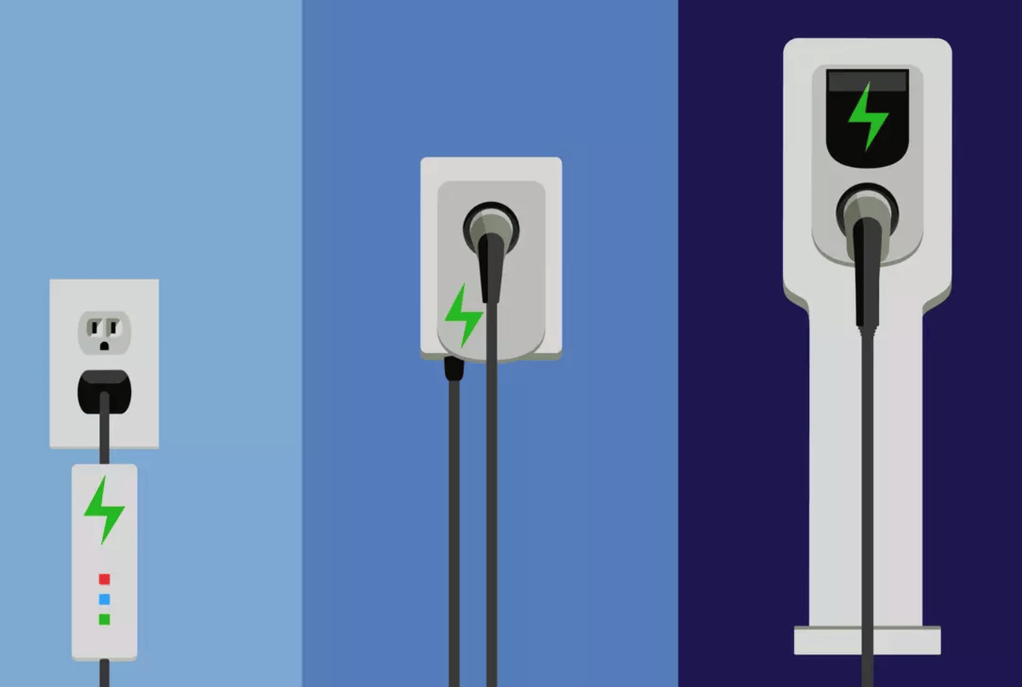 Image Source: Cars.com
Image Source: Cars.com
Level 2 Chargers
Level 2 chargers are the base level you should consider if you're looking to add chargers to your office. While they are more expensive than Level 1 chargers, but they can save your employees a significant amount of time. If you have many employees who drive EVs, a Level 2 charger is probably the best option for your business. It serves as a happy medium between the Level 1 and 3 chargers. As such, it is the most common type.
Level 2 EV chargers use a 240-volt outlet, like the kind you would use for a clothes dryer or oven. They are simple to use, often plugging into a wall connecter. Pictured below is the Tesla wall connecter, which comes at a price of $550. If a 220 volt outlet is not accessible in your facility, it will probably cost you $400 to $800 to install.

Image Source: Electrek
It can charge a typical EV battery in 4-6 hours, 10 times faster than the lower-level counterpart. Level 2 chargers are more expensive, but the cost here is worth it. Installation is a little more complicated than Level 1, so you might need to hire an electrician.
According to Forbes, "Level 2 chargers cost between $250 and $1,000, depending on the power and features available." Then, there is the installation cost, which is usually similar to the equipment price. However, know that there is a lot of variation within the Level 2 category. Its usage can come in 12, 16, 20, 34, 32, 40, 48 or 64 amps. Depending on the output, these chargers can provide 12 and 80 miles of range per hour, according to Forbes.
Level 2 chargers service app compatible features in EVs. Users can easily track their energy levels and necessary charge time.
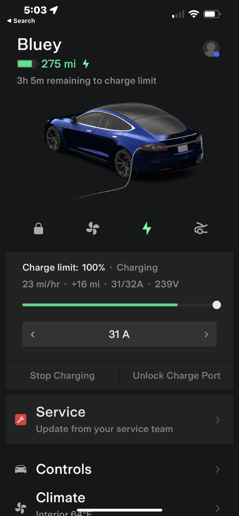
Level 3 Chargers
Level 3 chargers are the most expensive and fastest option. They use a 480-volt outlet, but the full accessibility can range to 900 volts. They boast incredible functionality, recharging an EV battery at a rate of 3 to 20 miles per minute. As such, a vehicle can be ready in as little as 30 minutes. These chargers are also known as DC fast chargers because they use direct current (DC) instead of alternating current (AC).
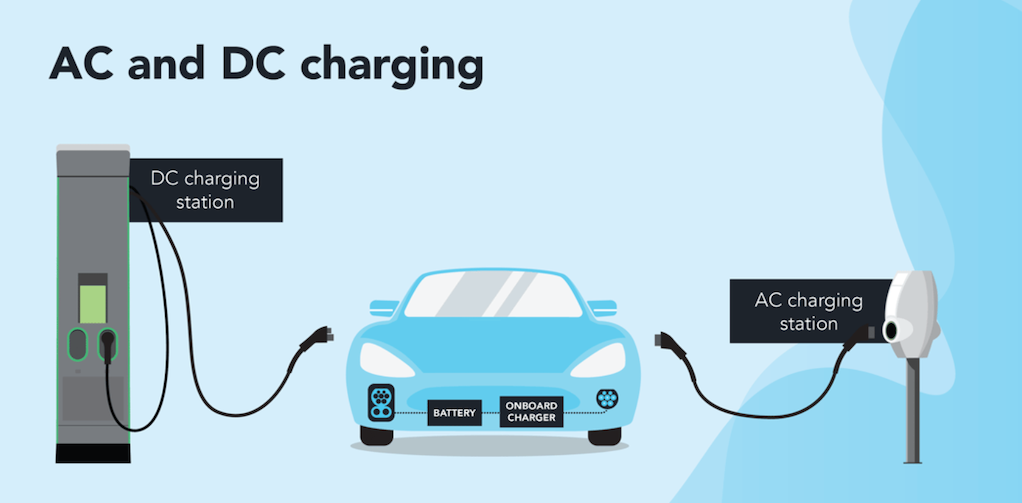
DC chargers (Level 3) vs. AC chargers (Levels 1 & 2). Image Source: Evbox
Level 3 chargers are designed for heavy-duty use, so they are perfect for businesses with a large number of EV-driving employees. Yet, they come with a much steeper price range. According to Forbes, "DC fast chargers cost tens of thousands of dollars.”
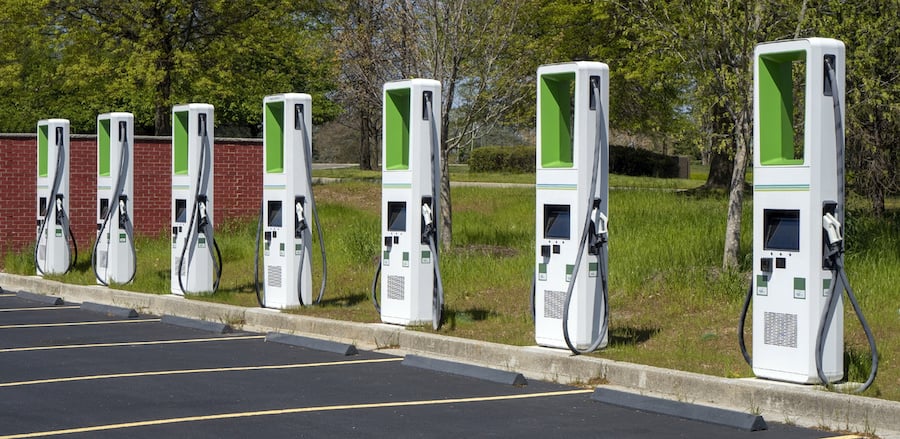
However, be prepared to face the other costs and caveats of including Level 3 chargers in your workplace. According to Clipper creek, ”Buildings and other installation sites will usually require specialized electrical infrastructure to safely support electric load capacities. Specialized infrastructure may also require new transformers, additional utility services, and recurring maintenance, all of which can increase costs.”
Megawatt Charging Systems
With exponentially more power capability, megawatt charging systems (MCS) are intended for heavy duty commercial use only. They allow for the charging of trucks, busses, ships, and planes for large-scale clean transportation. They cater to larger capacity batteries, traditionally Class 6, 7, & 8 commercial vehicles. Megawatt charging systems are being primarily developed by CharIN (Charging Interface Initiative EV). They come equipped with a max voltage of 1,250 V and a max current of 3,000 A.
Tesla also has its model of the MCS which caters to its electronic semi-truck line. They installed the first charger of its kind at the the Frito Lay factory in California in May of 2021.
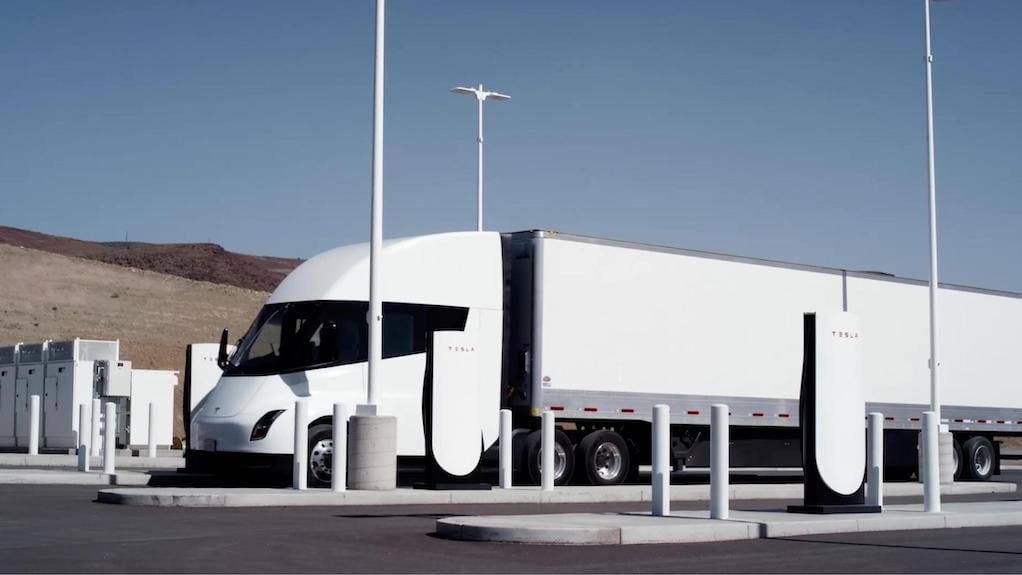
If your business regularly services trucking and is looking to become more sustainable, MCS is definitely something to consider implementing in your facility. However, this will likely only be useful in warehouse spaces.
Cost Considerations
Some businesses offer free EV charging for their employees as a perk. If you’re considering this, make sure you understand the costs associated with installing and maintaining EV chargers. This is especially true if you’re considering Level 3 chargers which usually come at a base rate of $15,000 to $50,000 without the specialized infrastructure required. Be prepared for ongoing charges associated with any EV charging stations, including:
- Electricity
- Network charges
- Maintenance
However, at the end of the day, it may not be as expensive as you think. Numerous state and federal incentives can negate the costs associated with EV charging stations. For example, New York provides an income tax credit of up to $5,000 to purchase and install an electric vehicle charging station. The credit is targeted at commercial and workplace charging stations. There are also federal tax incentives that can offset up to 30% of the costs associated with buying and installing a charger.
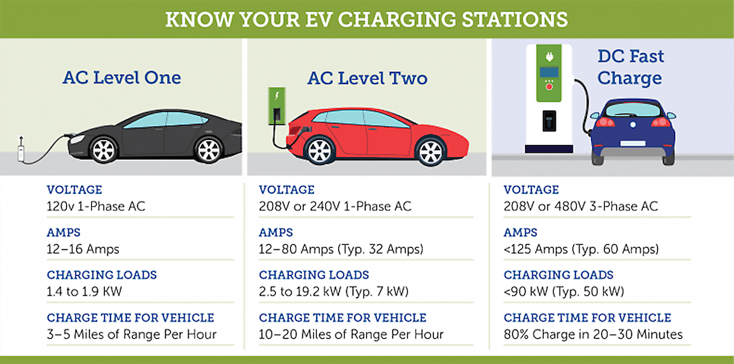 Image Source: PNM
Image Source: PNM
Occupying a building that maintains green standards also has other positive budgetary implications. For example, if we look at the New York City Climate Mobilization Act, buildings that exceed 25,000 square feet will need to reduce their greenhouse gas emissions by 40 percent by 2030. Getting ahead and earning extra points to a LEED certification could open the door to other tax breaks that make the investment well worth it.
Should You Include EV Chargers in Your CRE?
EV stations will not only boost the morale of your employees who drive electronic vehicles but open a possibility for those who currently do not since they'll have access to reliable charging. In such a competitive workforce, this could be an excellent way to attract and retain great talent. Prioritizing your employee experience and dedication to their commute says a lot about what kind of company you are. It shows that your enterprise is on the cutting edge. It enhances the company brand as socially and environmentally responsible, which is more attractive to today's employee base.
So, if you're looking for a hand in weighing the factors, you can work with a Tenant Rep. Not only will they direct you to the right parking solutions for your business, but they can negotiate with your landlord to ensure you get the best deal. At iOptimize Realty®, we are true Tenant Reps with 30+ years of experience directing our corporate clients to the optimal CRE decisions. Because of this, we've seen a lot of evolution throughout the years and can tell you without a doubt that the future of premier parking is electric. Don't get left behind.
Learn more about the Benefits of Including EV chargers now.
Talk to a true Tenant Rep today.
